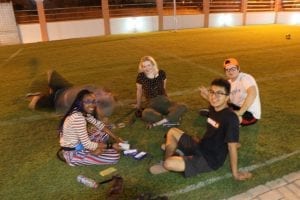After another delicious breakfast at the Dream Hotel, we began the day by visiting Abdulai’s mother. He emphasized the importance of visiting his mother, Mma Adisah and family whenever he returns back to his hometown of Tamale. As a close community, word travels fast and Abdulai explained that his mother especially should first hear of his return from himself. Visiting his mother is a way to pay his respects for all that she has done. When we arrived at her home, she sat as we greeted her one by one with the expression for hello, “Nnaa”.
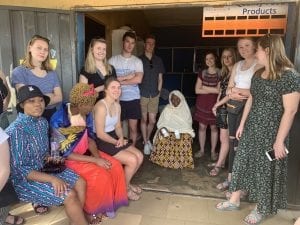
Then, Abdulai explained to her the goals of our class in coming to Ghana to study slavery. He presented her with gifts before we left– two large bottles of medicine, vitamins, and two packets of Icy Hot cream that she can use on her own. She lives Abdulai’s sisters now, since Abdulai’s father passed 16 years ago. However, she has many neighbors that help whenever she is in need. In their community, neighbors are family. Because of this, Abdulai asked Chris to come with him to say hello to Mma Adisah’s neighbors and to share his gratitude for looking over his mother. This was the final of acts in paying respects that is required every time he returns to Ghana.
On the way to our next destination, we had the chance to drive past Abdulai’s original home where he grew up, which was an especially cool sight to see!
The Dakpema’s Palace
The next place we went was Dakpema Palace, where we met the chief. It was intended to announce our presence in town and to assure him we of our good intentions and for support and protection while we go about our endeavors. This is a crucial aspect of community entry, the wrong move could jeopardize our project. It’s like getting into a house though the door or the window. Entry through the window might portray the entrant as a thief. We waited patiently outside the palace for the relevant office holders to be assembled.
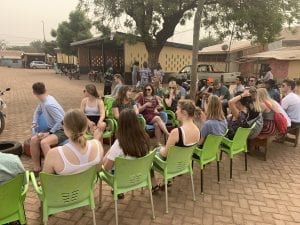
The chief speaks through a linguist who facilitates communications between the chief and his people.
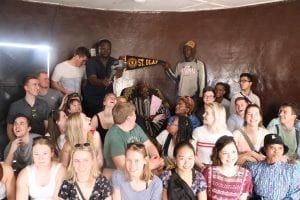
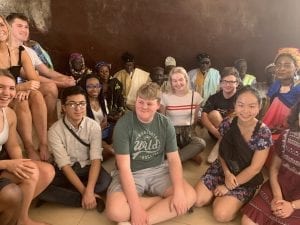
One interesting aspect of the chief’s life is their power in the clan, though this power is progressively eroded through the colonial encounter. His demands used to be met and one interesting aspect of it, according to Professor Iddrisu, was in marriage. The chief could just point at a lady and that lady becomes his. “He can select any woman and she will be brought to him.” This aspect of his power is no longer evident for the Dakpema but the overlord, the Yaa Naa, still has that power.
The LamasheNaa
We paid another visit a prominent Dagbon chief, the LamasheNaa. He admonished us to take our study abroad serious and take notes of whatever is going on so that we return home as aspects of the places we have visited.
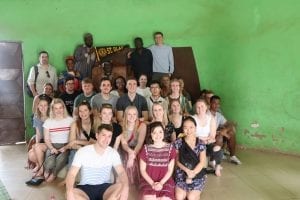
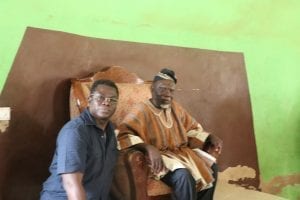
Some of us took individual pictures with the LamasheNaa.
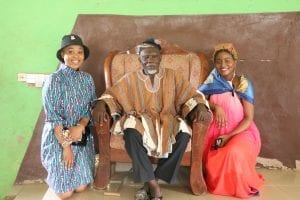
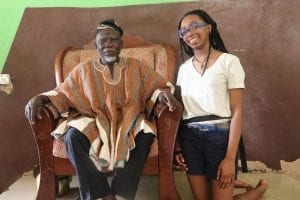
Lecture on Slavery in Northern Ghana
Our final stop of the day was to the University for Development studies Nyankpala campus which is one of the four campus locations of the only public university in northern Ghana. established in 1992, This specific campus was the agricultural and applied science campus. We were lucky enough to meet the principal of the school, the dean of students and Abdulai’s colleague and neighbor, Dr. Felix Yakubu. The two have houses next to each other, and attended the same university. He called Prof. Iddrisu, his mentor. Prof. Iddrisu actually made his start as a teacher working at this university before he came to the United States. Professor Yakubu gave us an important lecture on slavery in northern Ghana. We we’re able to hear him speak about the two types of slavery in Ghana present before the 1800s; commercial and indigenous, the method through which slaves were acquired (ex. Pawning, inheritance, and capture), and the people’s reactions to the slave raiders (flee, convert, build defenses). After his lecture our class asked many questions bringing up aspects like the Arab slave trade, the role of women in slavery, and debated what was the real “end” of the slave trade which we found to be much later than the official law to ban the slave trade in 1807 and slavery itself in 1833. Dr. Yakubu commended the group for competing ourselves and for our engagement through questioning.
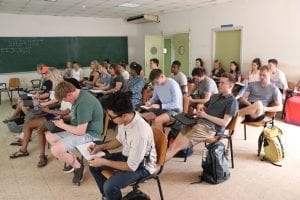
We ended the day at the university with a group photo before heading on the bus back to lunch.
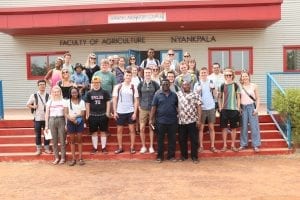
Lunch was some delicious street food! It was so good we returned for dinner later that night! We ended our night by meeting and playing soccer with Jazee’s children.
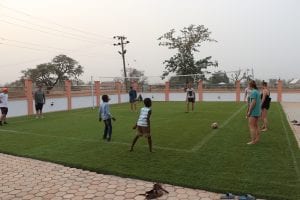
And later playing some competitive games of volleyball!
